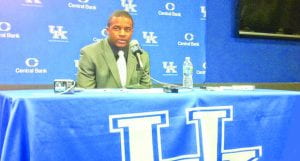By ALEC HUDSON – STAFF WRITER
Social media has revolutionized the way humanity is able to communicate. In a matter of a few seconds with a phone, touch-pad, computer, or game console, people can read posts from across the globe.
These posts range from celebrity news to what your brother had for breakfast. But in the world of collegiate and professional sports, social media posts have become something of a problem as many players are posting vain, insulting, or offensive items on their social media accounts.

This is nothing new; anyone who has spent time on these sites knows that there are those who feel the need to post ridiculous, hyperbolic, and overly-personal statements that may not be appropriate for the public.
The problem with athletes posting such statements online is because they have such a large audience, offensive comments are much more likely to be seen and reacted to negatively.
Former San Diego Chargers wide receiver Demetrius Byrd was cut after a tweet questioning whether liking Justin Bieber made him gay. Former UK football player Randall Cobb chastised UK fans for booing the team and leaving the staduim early in a game against South Carolina during 2010, which angered some UK fans. Athletes such as these players have taken to social media to express their views, often in ways that are later judged to be inappropriate.
Often, these tweets have been sexist, racist, homophobic, or downright mean, and the general managers and administrators of both professional and collegiate teams have been quick to censor or punish players for such posts.
The reasons for these posts are often silly or pointless, and players, like Byrd for example, put their career on the line when they make these statements. So why do we care? What are the implications of such foolish claims?
Centre professors recognize the realities and negative connotations of the actions of these athletes.
“What bothers me are the players and coaches who insult each other through female-oriented slanders,” H.W. Stodghill, Jr. and Adele H. Stodghill Professor of Psychology Dr. Mykol Hamilton said. “The culture that allows players to call each other ‘ladies’ or ‘pussy’ is obnoxious, as if the worst thing to be called is a woman.”
Assistant Professor of Psychology Dr. Goetz, on the other hand, emphasized the power these athletes have over popular culture. “Power does corrupt,” Goetz said, “We tend to unconsciously respect and copy things highly successful people do, and because of this, the impacts of such statements can be stronger.”
But is such outcry or criticism a new concept given the new level of communication via social media?
“There’s nothing very different about scrutinizing athletes and celebrities, it’s just at a new, broad level. I’m annoyed when athletes say we hold them up to a
higher standard. If you are going to get rich by entertaining the public, you enter into a bargain with the public to be careful about what you say,” Hamilton said.
Goetz also agreed with the appropriateness of public scrutiny. “Players are subject to critique,” Goetz said. “Although we afford them influence through their popularity, public feedback is good.”
But is it also appropriate for teams to punish players for these posts? Both professors agreed, while they were not fond of the idea of curtailing the right to speech, such posts harm the image of the team as a whole as well as the management and franchise. And in the end that is what players need to remember when they are online: whatever they say could be harmful to the image and morale of the team as a whole. In the world of competitive team sports, image and morale matter more than the desire for an emotional outburst.
